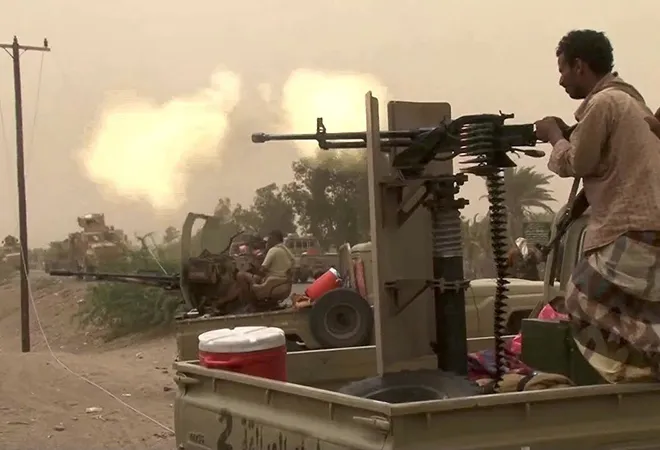-
CENTRES
Progammes & Centres
Location

Image Source: YouTube
File photo of a street fight as the Arab alliance closes in to capture Yemen's Hodeidah airport
With its first spark in Tunisia, the Arab Spring domino has been disastrous for many of the geographies it rolled into. Largely, three directional courses were charted. The first (and most harmless) course had governments respond with lethal threat and force. The second course had countries recoil and spring back semblances of people’s rule, only to be upstaged by multi players. The last were a set of unfortunate geographies, which are still at war. Years on and counting.
Yemen belongs to the third course, and has been rather unfortunate in these turn of events. One of the poorest countries in the West Asia, its already pulverised infrastructure and economy became a proxy military battleground for regional powers. (Read Shia and Sunni regional powers). Though the numbers are disputed, Shia Muslims are believed to represent close to 35% of Yemen’s population, while the Sunnis constitute 65%. A weak economy, a partly stateless geography with too much of each sub-group population for the others comfort. Welcome, disaster.
The Houthis are a predominantly Zaidi Shia (Zaidi or the Five Imam Shias, slightly different from their Shia brethren in Iran, who are Imamiyyah or Twelve-Imam Shias) political movement based in Saada in northern Yemen. They have been waging a low intensity insurgency against the Yemeni government for more than a decade now, and the country had seen various stages of ceasefire and conflict in the last decade and a half. The conflict and disagreements started taking stronger direction after the Arab Spring (2011), and the Houthis were part of the political dialogue process that emerged in Yemen. However, in January 2015, unhappy with a proposal to split the country into six federal regions, they became disillusioned and turned against the government, fearing the Gulf-sponsored political deal was designed to weaken their influence.
The Yemen war began in March 2015, when a Saudi-led coalition of Arab states launched air strikes against Houthi targets after the group started to advance towards southern Yemen.
Three years on, with mounting civilian and military casualties, this war has perpetuated fears of a full blown regional war between Shia and Sunni powers and waxing and waning influence of each of the sides in the duration. Estimates on war fighting casualties range from 10,000-35,000 with more than 60,000 wounded.
The biggest impact however, has been widespread starvation and a cholera outbreak in this time. With thousands dead to cholera and more than 8 million Yemenis at the risk of starvation, this is one of the biggest humanitarian crises confronting the world.
And this comes to a crucial juncture now. A decisive turn.
The UAE/Saudi coalition just recently launched (13 June, 2018) an all-out operation against the Houthi controlled western port city of Hodeidah.
Hodeidah is Yemen’s lifeline. Even before the war, it handled most imports in a country where a staggering 90 per cent of food had to be imported.
As Yemen’s key commercial centre, through which more than 70 per cent of the country’s imports, food and aid shipments flow, an offensive by the Saudi coalition to retake the city has always been inevitable.
 Source: Risk Intelligence, AFP
Source: Risk Intelligence, AFP
Seized by the Houthis early in the now three-year-old war, the city has been subject to a Saudi-led coalition blockade since 2015, which humanitarian organisations say is largely responsible for the fact eight million Yemenis are now living on the brink of famine.
A total sealing of the port in November 2017 by the Saudi coalition is estimated to have pushed an additional three million people into hunger, the World Food Programme says.
Estimates on the sizes of the opposing sides give a distinct advantage to the Saudi-led coalition. The Saudi coalition is estimated to have up to 25,000 fighters, in addition to fighter jets and Apache helicopters, involved in the operation. The Houthis have no more than 10,000, mostly inexperienced fighters around Hodeidah.
And now the possible outcomes. Either the Houthis will get pushed to the north entirely and crack into a negotiation or the war will see further protraction of the last three years (with urban guerrilla warfare by the Houthis), sealing off this critical logistical lifeline, and thus deepening the humanitarian crises.
Perhaps Hodeidah will produce the elusive negotiated deal. Perhaps it won’t.
The views expressed above belong to the author(s). ORF research and analyses now available on Telegram! Click here to access our curated content — blogs, longforms and interviews.

Avijit Goel is a Senior Director with Flipkart. An alumnus of the Oxford University
Read More +